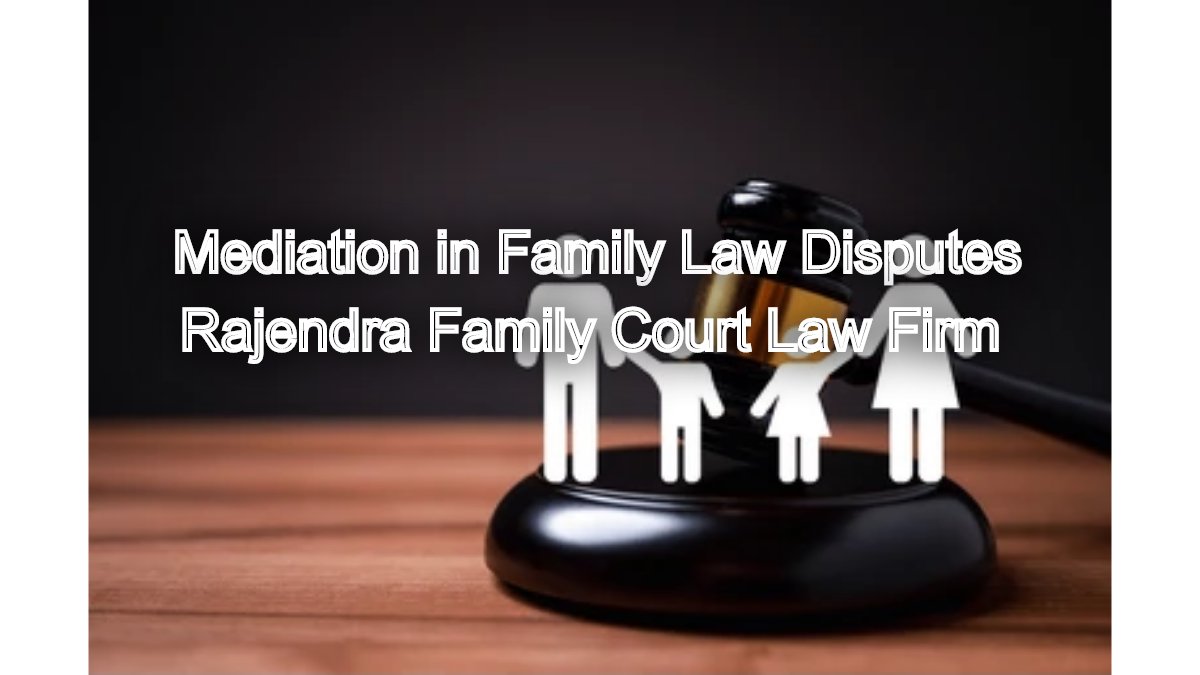The Role of Mediation: Family law disputes can be emotionally charged and legally complex. Traditional litigation often leads to adversarial proceedings, which can exacerbate tensions and prolong the resolution process. Mediation, however, offers a more amicable and efficient approach to resolving family law matters. Rajendra Family Court Law Firm, a renowned law firm in India, specializes in family law and emphasizes the importance of mediation as a powerful tool for resolving disputes.
The Role of Mediation in Family Law Disputes: A Peaceful Resolution
Understanding Mediation
Mediation is a voluntary process where a neutral third-party mediator facilitates communication between the disputing parties. The mediator helps the parties to understand each other’s perspectives, identify common ground, and reach a mutually agreeable settlement. Unlike traditional litigation, mediation focuses on finding solutions that are fair, reasonable, and tailored to the specific needs of the parties involved.
The Benefits of Mediation
Mediation offers several advantages over traditional litigation:
- Preserves Relationships: Mediation can help preserve relationships, especially in cases involving children. By fostering open communication and understanding, mediation can minimize animosity and facilitate amicable resolutions.
- Faster Resolution: Mediation is often a quicker process than litigation. It eliminates the need for lengthy court proceedings, saving time and reducing stress.
- Cost-Effective: Mediation is generally more cost-effective than litigation. It avoids the high costs associated with court fees, legal fees, and expert witness fees.
- Flexibility: Mediation offers flexibility in terms of scheduling and the scope of issues discussed. The parties can tailor the process to their specific needs and preferences.
- Confidentiality: Mediation proceedings are confidential, allowing the parties to discuss sensitive matters without fear of public disclosure.
- Empowerment: Mediation empowers the parties to take control of the decision-making process and reach a solution that works for them.
Rajendra Family Court Law Firm: Your Trusted Partner in Mediation
Rajendra Family Court Law Firm has a team of experienced family law attorneys who are skilled mediators. They understand the emotional and legal complexities of family law disputes and are committed to helping clients find peaceful resolutions. Their approach to mediation is empathetic, patient, and results-oriented.
The firm’s mediation services cover a wide range of family law matters, including:
- Divorce: Mediating the terms of divorce, including property division, child custody, and spousal support.
- Child Custody and Visitation: Developing parenting plans that prioritize the best interests of the child.
- Child Support: Determining appropriate child support payments.
- Spousal Support: Negotiating fair and equitable spousal support arrangements.
- Property Division: Dividing marital assets and debts equitably.
Frequently Asked Questions
Mediation is a voluntary process where a neutral third-party mediator facilitates communication between disputing parties. The mediator helps them understand each other’s perspectives, identify common ground, and reach a mutually agreeable settlement.
Mediation offers several advantages, including:
Preserving Relationships: It can help maintain positive relationships, especially when children are involved.
Faster Resolution: It is often quicker than traditional litigation.
Cost-Effective: It can be more affordable than litigation.
Flexibility: It allows for tailored solutions.
Confidentiality: It ensures privacy.
Rajendra Family Court Law Firm has experienced family law attorneys who are skilled mediators. They can help you:
Understand the mediation process.
Prepare for mediation sessions.
Negotiate effectively.
Reach a fair and equitable settlement.
No, mediation is not mandatory in all family law cases. However, courts often encourage it as a preferred method of resolving disputes.
The cost of mediation varies depending on the complexity of the case and the time required. However, it is generally more affordable than traditional litigation. You can discuss the fees with your mediator and your attorney.
Conclusion
Mediation is a powerful tool for resolving family law disputes. By choosing mediation, parties can avoid the stress and expense of litigation and achieve amicable solutions that are tailored to their specific needs. Rajendra Family Court Law Firm is dedicated to helping clients navigate the complexities of family law and find peaceful resolutions through mediation.
Read More
- How to Navigate Child Custody Disputes Successfully
- Divorce in 7 Days: Expert Advice
- Can Only One Spouse Save a Marriage? Best Advisory Services
- Understanding Divorce: A Comprehensive Guide for Spouses
- “Divorce Case Retainer Legal Services in Chennai – Top Lawyers”
- National Legal Services Authority (NALSA):
](https://www.lawfirm.org.in/wp-content/uploads/2024/01/cropped-Rajendra-Family-Court-Law-Firm-Divorce-Lawyers-Criminal-Attorneys-24x71-1.jpg)



